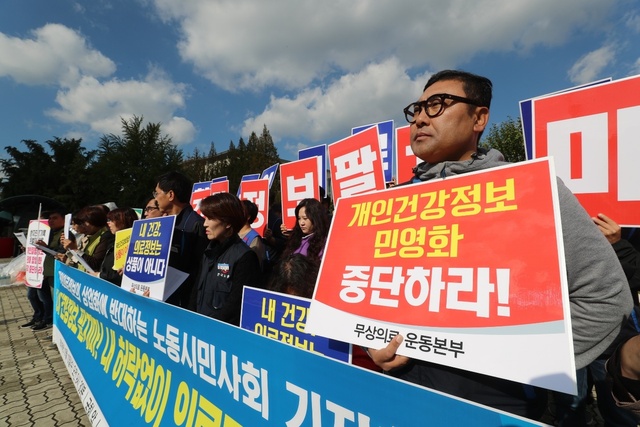 |
|
Civic groups gather outside the National Assembly in Seoul to protest the deregulation of private medical data on Oct. 10. (Shin So-young, staff photographer)
|
Privacy concerns clash with government big data projects
“How many times have you been pregnant and given birth?” “How many miscarriages or abortions have you experienced?” Questions like these are often asked by physicians during gynecologist visits. During childbirth, symbols are used to represent the patient’s obstetrical history, including the number of pregnancies, deliveries, miscarriages, and births. But what happens when this information is converted for data to be shared between hospitals – and even leaked to insurance and pharmaceutical companies? “If the medical records of women who have been sexually victimized or experienced abortions is commercialized, women could be excluded from various medical benefits and socially stigmatized,” warned Baek Mi-soon, co-chair of Korean Women's Associations United (KWAU). The same is true for sensitive medical information such as treatment of psychological conditions, family histories, and hereditary diseases. Amid a move by the South Korean government to loosen regulations of personal medical information, the Campaign Headquarters for Free Healthcare, People’s Solidarity for Participatory Democracy (PSPD), and other labor, civic, and social groups held a press conference on Oct. 10 in front of the National Assembly in Seoul’s Yeouido neighborhood to announce the launch of the “Don’t Sell My Health Information!” national signature campaign (http://noselldata.jinbo.net/) opposing commercialization of personal medical data. Government’s 3 main big data projects The South Korean government is currently pursuing three main big data projects involving medical information. The first is the Ministry of Health and Welfare-led “Public Health and Medical Big Data Platform” project, which is to combine data from four public institutions – including National Health Insurance Service health examination data and Korea Centers for Disease Control & Prevention genome information – for use in “health management for vulnerable populations” and other purposes. The second is the “Bio/Health Big Data Platform” project initiated by the Ministry of Trade, Industry and Energy. A network is currently being built to standardize and share medical data for 50 million people from 39 major hospitals, including the Samsung Medical Foundation. The third is the Ministry of Science and ICT’s “My Data” project, allowing individuals to download their own health examination and other data for a health management service app. Dangers and risks of mass linking medical data Some have voiced fears that personal medical information could be stockpiled by the insurance and telecommunications companies operating the app. The Ministry of Science and ICT fueled the controversy further by demanding that the National Health Insurance Service provide its personal medical records to third parties. Meanwhile, full-scale medical big data projects are under way on the market with collaborations Kakao and Seoul Asan Hospital and between Naver and Seoul National University Bundang Hospital. The government projects were also the subject of debate in a parliamentary audit the same day by the National Assembly Health and Welfare Committee. Justice Party lawmaker Youn So-ha asked about future linkages between the Ministry of Health and Welfare’s public institution medical data project and the Ministry of Trade, Industry and Energy-led private hospital medical data standardization model. With Ministry of Health and Welfare currently moving to standardize medical data from the National Health Insurance Service and three other public institutions, Youn voiced concerns that the information could be combined with the 39 hospitals’ Big Data Platform and commercialized. In his response, Minister of Health and Welfare Park Neung-hoo said, “The Ministry of Health and Welfare has also voiced concerns about personal identification with the MOTIE project and will not be linking its personal medical information with private data in the future.” He also said the ministry had “decided not to consider the Ministry of Science and ICT request for medical information” that could potentially be provided to insurance companies. Woo Seok-gyun, co-representative of the group Physicians for Humanitarian Action, said, “Medical data contains the most sensitive information about a person.” “It’s not just data – it’s the person,” Woo said, arguing that the situation demands increased rights of self-determination and control over personal medical information rather than deregulation. Noting the existence of resident registration numbers and frequent leaks of personal information in South Korea, Woo added that there is a serious risk that individuals can be identified from their medical information even when false names are used in its processing. By Hwang Ye-rang, staff reporter Please direct comments or questions to [english@hani.co.kr]






